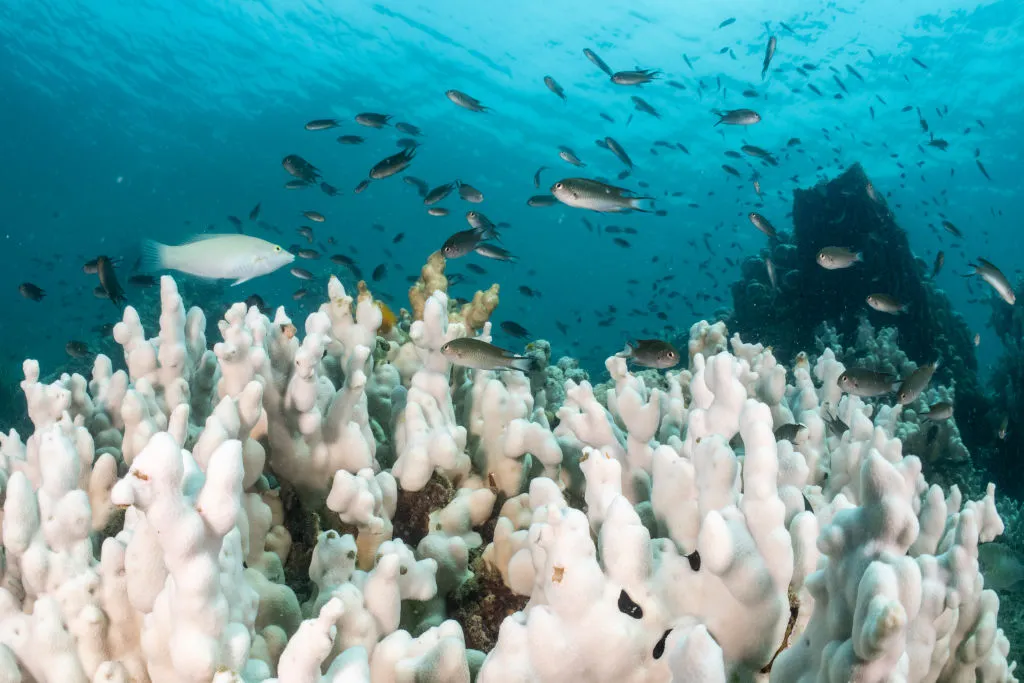In a strong warning that points out the accelerating pace of climate change, a landmark report released on October 13, 2025, declares that the world’s warm-water coral reefs have crossed the planet’s first major climate change tipping point.
This irreversible shift means widespread mortality is now underway, with massive portions of these vital ecosystems facing collapse unless global warming is urgently reversed.
As temperatures continue to climb, the loss of coral reefs isn’t just an environmental tragedy; it’s a warning of increasing crises that could destroy life on Earth as we know it.

What Is a Climate Change Tipping Point?
A climate tipping point refers to a threshold in the Earth’s systems where small changes in temperature or other factors trigger large, often irreversible shifts in ecosystems or global processes.
These aren’t gradual declines; they’re abrupt shifts that can lock in new, less stable states.
Coral reefs, which thrive in narrow temperature bands, are particularly vulnerable: when sea surface temperatures rise just a few degrees above normal for prolonged periods, corals expel their symbiotic algae in a process called bleaching, leading to starvation and death.
The Global Tipping Points Report 2025, compiled by 160 scientists from 87 institutions across 23 countries, identifies warm-water coral reefs as the first such system to breach this critical boundary.
Led by experts like Professor Tim Lenton from the University of Exeter, the report synthesises the latest data on everything from marine heatwaves to biodiversity loss.
The Science Behind the Tipping Point
Scientists pinpoint the tipping point for coral reefs at approximately 1.2°C of global warming above pre-industrial levels, with an upper limit of 1.5°C.
We’re already at 1.3–1.4°C today, a level that has fuelled the most severe global bleaching event on record from 2023 to 2025, affecting nearly 84% of the world’s reefs. This isn’t a one-off; bleaching events have surged in frequency and intensity.
The Great Barrier Reef, for instance, has endured six major episodes in the past decade alone, including a “catastrophic” widespread event in early 2025.
Evidence comes from satellite monitoring, on-site surveys, and modelling that shows how repeated heat stress erodes reef resilience. Once bleached, corals struggle to recover, especially amid compounding threats like ocean acidification and pollution.
READ ALSO:
Can a Single Molecule Redefine Sustainability? Inside the 2025 Nobel Chemistry Win
The report concludes: “A majority of [coral reefs] are suffering (or will suffer) widespread dieback,” transitioning to algal-dominated ecosystems that bear little resemblance to the vibrant structures we associate with reefs.

Global map of the 2023-2025 coral bleaching event, showing alert levels across oceans.
Devastating Impacts on Nature and People
Coral reefs occupy just 0.2% of the ocean floor but support a quarter of all marine species, serving as nurseries for fish and buffers against coastal erosion.
Their collapse threatens food security for nearly a billion people, disrupts fisheries worth billions annually, and erodes economies valued at over $2 trillion yearly in tourism, protection from storms, and pharmaceuticals.
In regions like the Caribbean and Southeast Asia, entire communities face existential risks as livelihoods vanish and storm surges intensify.
This tipping point isn’t isolated. The report warns it’s the first domino in a chain that could include Amazon dieback, Antarctic ice sheet melt, and disruptions to ocean currents like the Atlantic Meridional Overturning Circulation (AMOC).
“We are rapidly approaching multiple Earth system tipping points that could transform our world, with devastating consequences for people and nature,” says Lenton. Without action, these could amplify warming, biodiversity loss, and food insecurity on a global scale.
Dr Mike Barrett of WWF-UK calls it a “tragedy for nature and for the people who rely on them for food and income,” urging it as a “wake-up call” to prevent further losses.
A Glimmer of Hope? Paths Forward
While the damage is severe, the report isn’t all doom but a blueprint for action. Reversing warming below 1.2°C is unlikely, but rapid emissions cuts could preserve isolated refuges and buy time for restoration.
Positive tipping points, like the boom in solar power and electric vehicles, show how swift societal shifts can counter the negatives.
Experts emphasise integrating tipping point science into policies ahead of COP30 in 2025. Dr Laura Pereira from the Stockholm Resilience Centre stresses equitable solutions: “We cannot address the climate crisis by perpetuating the same systems of injustice… we need deeper, more equitable solutions.”
This means slashing fossil fuels, protecting marine areas, and investing in resilient infrastructure.
Terry Hughes from James Cook University, a veteran reef researcher, notes the transition is already underway but insists governments must act beyond local fixes: “This is a wake-up call for governments to urgently address the crisis.”
Entering a ‘New Reality’
The crossing of this tipping point marks our entry into what scientists call a “new reality” one where human activity has reshaped the planet’s fundamental systems.
Coral reefs’ dieback is a powerful reminder of our shared vulnerability, but it’s also a wake-up call. With decisive global action, we can still steer away from the worst cascades. The question is: Will we?
As we stand on October 14, 2025, the choice is ours. Let’s make it count for the reefs, the oceans, and the billions who depend on them.
Ronnie Paul is a seasoned writer and analyst with a prolific portfolio of over 1,000 published articles, specialising in fintech, cryptocurrency, and digital finance at Africa Digest News.






